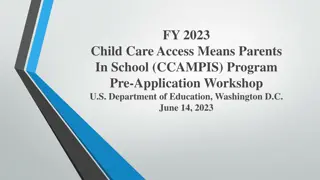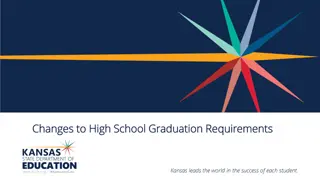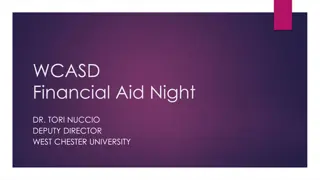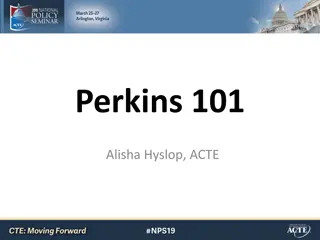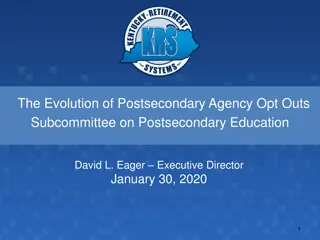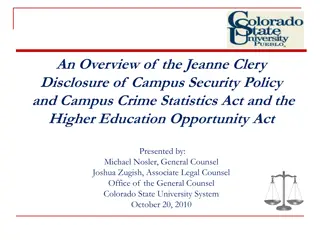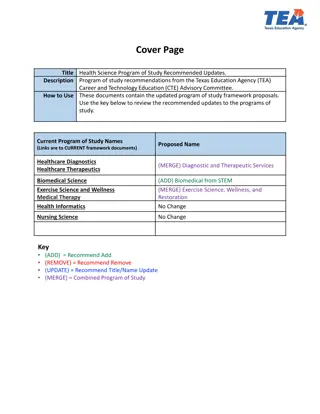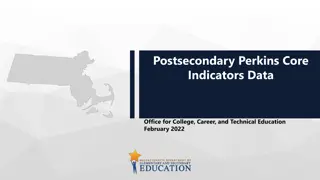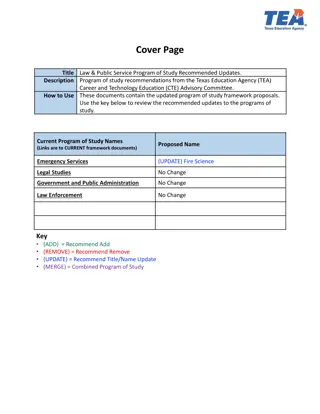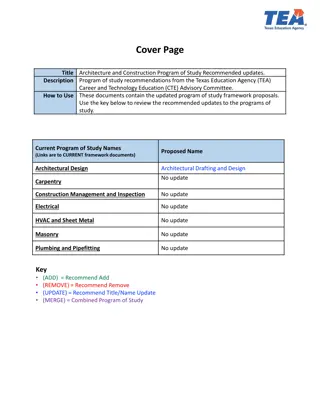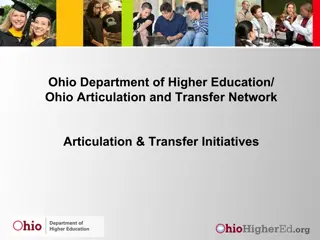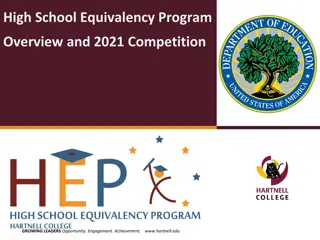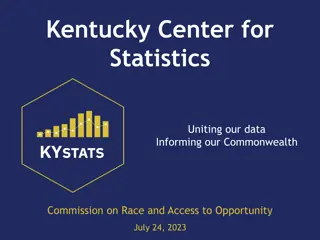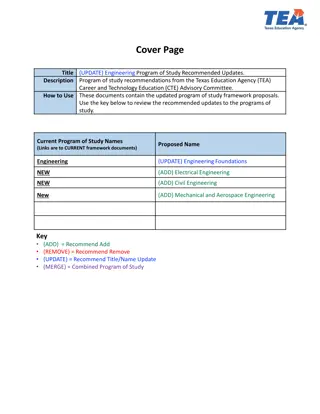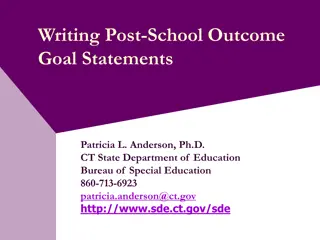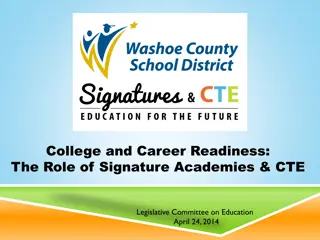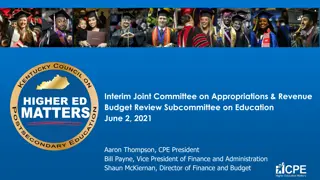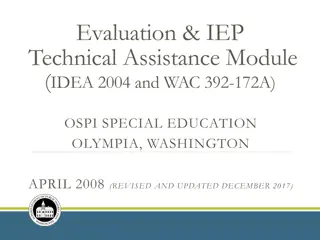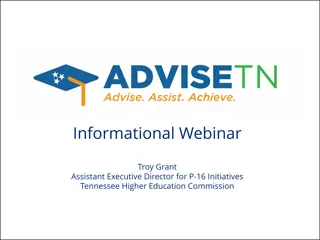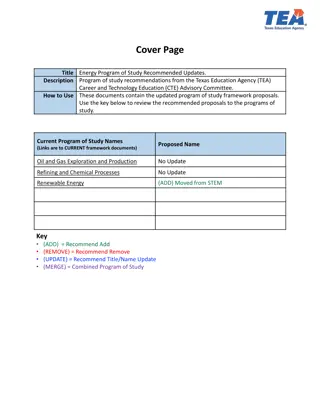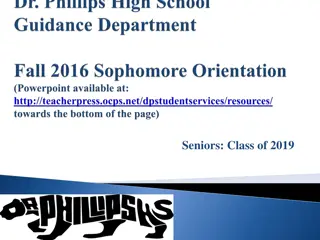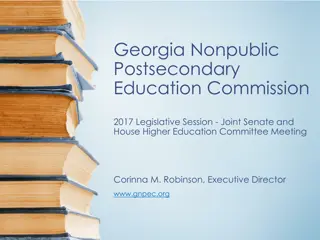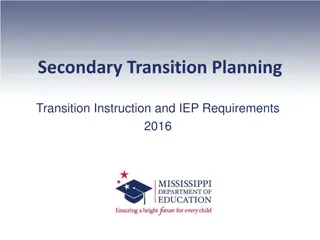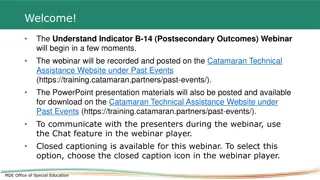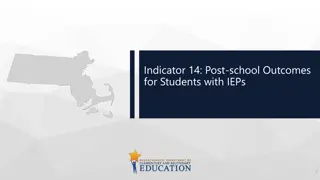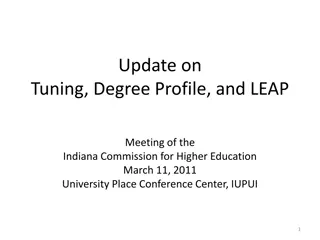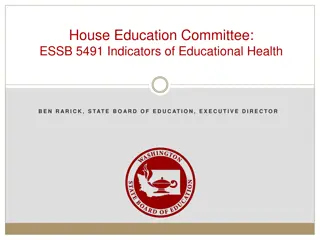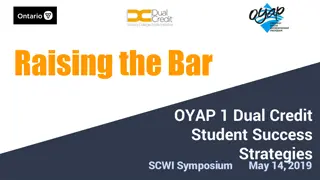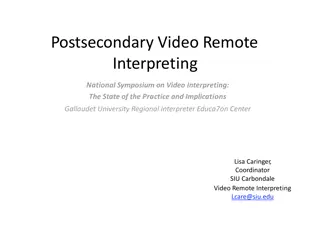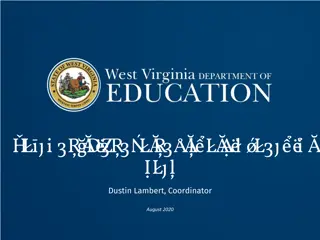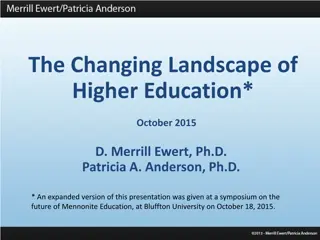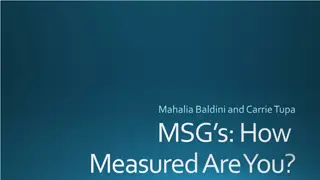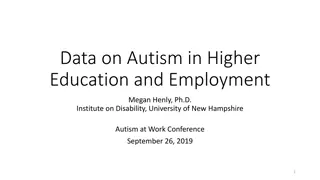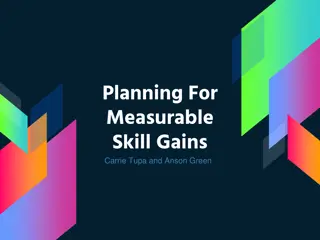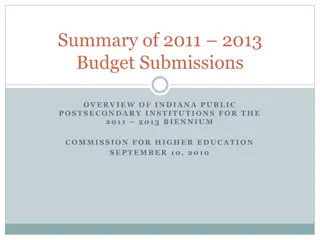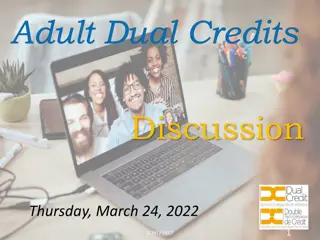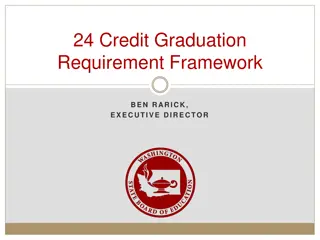Career-Connected High School Grant Program Overview
The U.S. Department of Education's Career-Connected High School Grant Program aims to expand access to career-connected high school programs for students. With a project period of up to 36 months, the program impacts over 10,000 Wisconsin students through initiatives such as career advising, dual en
0 views • 11 slides
CCAMPIS Program Overview: Funding Opportunities for Campus-Based Child Care Services
The CCAMPIS program, authorized under the Higher Education Act of 1965, supports low-income parents in postsecondary education by providing campus-based child care services. Institutions of higher education that received $250,000 or more in Federal Pell Grant funds in FY 2022 are eligible to apply f
2 views • 32 slides
Comprehensive Updates to High School Graduation Requirements
The proposed changes to high school graduation requirements include a focus on mastery and competency, completion of postsecondary assets aligned with Individual Plans of Study, and revised course classifications in areas such as Communications, Society & Humanities, and STEM. Recommendations aim to
0 views • 11 slides
Understanding Financial Aid for College Education
Financial aid for postsecondary educational expenses plays a critical role in helping students and families afford college. This comprehensive guide covers various types of aid, application processes, scholarships, grants, federal loans, student employment opportunities, and important details about
0 views • 19 slides
Overview of Perkins V: Enhancing Career and Technical Education Programs
Perkins V aims to enhance academic knowledge and technical skills for secondary and postsecondary students in career and technical education programs. It outlines funding streams, definitions, prohibitions, authorization levels, and accountability requirements for states to improve performance level
3 views • 25 slides
The Evolution of Postsecondary Agency Opt-Outs: Recent Legislative Changes
Explore the legislative changes surrounding postsecondary agency opt-outs, from allowing certain agencies to exit the system with different payment options to addressing the quasi conundrum in the 2019 GA special session. Discover the challenges faced and the various options available for these agen
2 views • 11 slides
Understanding the Jeanne Clery Act and Higher Education Opportunity Act
The Jeanne Clery Act, renamed in 1998, mandates public and private postsecondary institutions to comply with campus security and crime reporting regulations. It requires policy disclosures, record collection, retention, and information dissemination. Additionally, the Higher Education Opportunity Ac
1 views • 32 slides
Proposed Updates for Health Science Program of Study in Texas
Recommended updates for the Health Science Program of Study by the Texas Education Agency's Career and Technology Education Advisory Committee include merging certain programs, adding new courses, and updating postsecondary opportunities to align with industry needs. The focus is on providing studen
0 views • 6 slides
Understanding Postsecondary Perkins Core Indicators Data for Career and Technical Education
This content presents information on Postsecondary Perkins Core Indicators Data from the Office for College, Career, and Technical Education, focusing on elements like accountability systems, improvement plans, and calculating indicators. The material emphasizes the importance of equal access to hig
0 views • 13 slides
Proposed Updates to Law & Public Service Program of Study in Texas
The Texas Education Agency's Career and Technology Education Advisory Committee recommends updates to the Law & Public Service Program of Study framework. Proposed changes include enhancing the Fire Science and Legal Studies programs, adding new courses, advanced academics offerings, and postseconda
0 views • 5 slides
Proposed Updates to Architecture and Construction Program of Study
Recommended updates for the Architecture and Construction Program of Study have been proposed by the Texas Education Agency (TEA) Career and Technology Education (CTE) Advisory Committee. The recommendations include maintaining existing program names and adding new courses to enhance students' learn
0 views • 8 slides
Ohio Department of Higher Education and Transfer Initiatives
Ohio Department of Higher Education focuses on transfer initiatives like Transfer Guarantees, Advanced Placement, CLEP Credits, Guaranteed Transfer Pathways, and more to help Ohioans achieve postsecondary credentials by 2025. They offer Transfer Modules, Transfer Assurance Guides, and Career-Technic
0 views • 20 slides
Empowering Agricultural Workers: HEP High School Equivalency Program Overview 2021
HEP, funded by a grant from the Department of Education, helps agricultural workers and their families achieve high school equivalency and pursue postsecondary training or better employment opportunities. Hartnell College's HEP program in California has been successfully meeting and exceeding perfor
0 views • 12 slides
Kentucky Center for Statistics - Data and Opportunity Insights
Kentucky Center for Statistics presents research data on population trends, education, workforce, and poverty rates in Kentucky, highlighting disparities by race. The analyses cover demographic shifts from 2010 to 2023, including youth population, poverty rates, inmate demographics, K-12 education s
0 views • 32 slides
Recommended Updates for Engineering Program of Study
The Engineering Program of Study recommendations from the Texas Education Agency (TEA) Career and Technology Education (CTE) Advisory Committee include updates to various fields such as Electrical Engineering, Civil Engineering, and Mechanical and Aerospace Engineering. The proposed program framewor
0 views • 5 slides
Understanding Post-School Outcome Goal Statements in Education
Secondary transition involves a coordinated set of activities to facilitate academic and functional achievement, preparing students for post-school activities like postsecondary education, employment, or independent living. Transition services must begin by age 16 and include measurable postsecondar
0 views • 27 slides
College and Career Readiness: Connecting Signature Academies and CTE Programs
This content discusses the essential connection between Signature Academies and CTE programs in preparing students for seamless transitions to postsecondary options. It delves into the role of these programs in providing dual credit opportunities, STEM education, and advanced placement, aiming to eq
0 views • 36 slides
Overview of Federal Coronavirus Relief Funds for Postsecondary Education in Kentucky
The Interim Joint Committee on Appropriations & Revenue discussed the distribution and utilization of Federal Coronavirus Relief Funds for postsecondary education in Kentucky. Funds were allocated for financial aid grants to students, institutional support, and various educational initiatives. The p
0 views • 26 slides
Empowering Students Through Career Technical Education & Career Advising
This module focuses on empowering students through effective career advising strategies, resources, and processes to explore future career options. It highlights the importance of Individual Learning Plans (ILPs) in career advising, fostering a mindset that prioritizes student interests, and creatin
4 views • 50 slides
Evaluation & IEP Technical Assistance Module - Special Education Overview
This module provides guidance on evaluations, IEPs, and special education for individuals with disabilities under IDEA 2004 and WAC 392-172A. It covers components, evaluations, reevaluations, prior written notice, consent, specially designed instruction, present levels, measurable annual goals, IEP
0 views • 109 slides
Advancing Higher Education Initiatives in Tennessee
Troy Grant, Assistant Executive Director for P-16 Initiatives at the Tennessee Higher Education Commission, leads efforts to support postsecondary institutions in Tennessee. With initiatives like Drive to 55 and Advise TN, the goal is to increase college degree attainment, provide college advising t
0 views • 24 slides
Recommended Updates to Energy Program of Study Framework
Texas Education Agency along with Career and Technology Education Advisory Committee recommends updates to the program of study framework for Energy Career Cluster. The proposals include adding a Renewable Energy program, suggested changes to existing programs like Oil and Gas Exploration and Produc
0 views • 4 slides
Graduation Requirements and Postsecondary Goals Information for Seniors - Class of 2019
In this resource provided by the DP Student Services, seniors of the Class of 2019 are guided on how to identify their specific graduation requirement needs and plan for their postsecondary goals. The meeting aims to raise awareness and help students understand what is needed to achieve their desire
0 views • 25 slides
Georgia Nonpublic Postsecondary Education Commission Overview
Georgia Nonpublic Postsecondary Education Commission (NPEC) is the state agency in charge of regulating private postsecondary institutions in Georgia and out-of-state institutions operating within Georgia. Established in 1990, NPEC ensures educational and financial stability, maintains standards, an
0 views • 10 slides
Enhancing Postsecondary Success for Students with Disabilities
Promoting successful transitions for students with disabilities is crucial to improving postsecondary outcomes. Addressing transition planning ensures students are equipped with the necessary knowledge and skills for college, career, and independent living. By focusing on effective transition instru
0 views • 77 slides
Understanding Postsecondary Outcomes - Indicator B-14 Webinar Overview
The Indicator B-14 webinar provides information on postsecondary outcomes for youth with IEPs, focusing on indicators like higher education enrollment and competitive employment within one year of leaving high school. The webinar covers survey procedures, response rates, and results from the Michiga
0 views • 51 slides
Understanding Indicator 14: Post-School Outcomes for Students with IEPs
Indicator 14 is a crucial measure used to assess the post-school outcomes of students with IEPs one year after they leave high school. It focuses on whether these students are enrolled in higher education, competitively employed, or engaged in other postsecondary education or training programs. Mass
0 views • 8 slides
Update on Higher Education Initiatives in Indiana
The presentation highlighted discussions on tuning, degree profiles, and LEAP initiatives by the Indiana Commission for Higher Education. Various contexts and recent developments in higher education discussions, including student learning outcomes, were covered in conferences and initiatives from 20
0 views • 16 slides
Enhancing Educational Health for Student Success
The House Education Committee discusses ESSB 5491 and the indicators of educational health, emphasizing the importance of all students planning for education beyond high school. Stakeholders provide input to align with recent research and systemic measures for postsecondary attainment. Data on growt
0 views • 19 slides
Strategies for Dual Credit Student Success in Trades Education Symposium
Explore the key strategies discussed at the SCWI Symposium focusing on enhancing success for dual credit students in trades education. The symposium involved panelists from various educational institutions and highlighted partnerships between colleges and school boards to bridge the gap between appr
0 views • 16 slides
Postsecondary Video Remote Interpreting Symposium: State of Practice and Implications
Explore the discussions and insights presented at the Postsecondary Video Remote Interpreting National Symposium, focusing on the state of practice and its implications in postsecondary environments. Topics covered include equipment requirements, interpreter standards, student advocacy, and the role
0 views • 7 slides
Personal Finance and Citizenship Education Resources
This collection of resources focuses on personal finance education within the context of citizenship education. It covers topics such as postsecondary education costs, career choices, financial aid decisions, and more. The materials include outlines, standards, teaching strategies, and contact infor
0 views • 19 slides
Trends in Higher Education Landscape
The evolving landscape of higher education in the United States is depicted through data on investment in postsecondary education, distribution of enrollments, enrollment trends by gender and post-graduation paths, and employment ratios based on educational attainment levels from 1972 to 2014.
0 views • 42 slides
Review of Measurable Skill Gains in Education Programs
This content provides a detailed review of Measurable Skill Gains (MSGs) in education programs, covering aspects such as skill gains, high school equivalency achievement, postsecondary progression, and workforce training. It also clarifies criteria for basic education gains under WIOA and discusses
0 views • 19 slides
Insights on Autism in Higher Education and Employment
Explore data sources, survey considerations, and sampling factors regarding autism in higher education and employment. Learn about commonly cited statistics on ASD prevalence and postsecondary education outcomes for individuals with ASD. Gain valuable insights from the Autism at Work Conference pres
0 views • 17 slides
Focused Skill Development Programs for Postsecondary Success
Providing targeted skill development programs for individuals aiming to excel in postsecondary education. Explore various scenarios and measurable skill gains to tailor programs effectively and ensure successful outcomes. Engage participants in essential training to enhance their academic performanc
0 views • 16 slides
Budget Submissions Overview of Indiana Public Postsecondary Institutions (2011-2013)
Detailed analysis of budget submissions for Indiana public postsecondary institutions from 2011-2013, including state appropriations, operating expenses, debt services, and total operating submissions funded by state funds. The data covers various institutions such as Ball State University, Indiana
0 views • 19 slides
Supporting Students in Apprenticeship Pathways: Strategies for Success
Explore the School-College-Work Initiative (SCWI) and its contributions to enhancing student transitions from secondary to postsecondary education through collaborative programs. Learn about supporting students interested in apprenticeship pathways and strategies for successful postsecondary steps t
0 views • 25 slides
SCWI/IJECT Collaboration for Adult Education: Enhancing Transitions to Postsecondary
The SCWI/IJECT initiative aims to improve transitions for adult students into college and apprenticeship programs through collaborative activities and programs. The 2022-25 requirements focus on expanding awareness of adult Dual Credits and supporting adult students in Adult Day Schools and Continui
0 views • 33 slides
Washington State Board of Education 24 Credit Graduation Requirement Framework
Graduation requirement guiding principles aim to ensure all students receive foundational high school credits, including STEM courses. Postsecondary pathways offer options like CTE programs and pursuing degrees. Stakeholder input suggests creating personalized pathway requirements and expanding the
0 views • 7 slides

